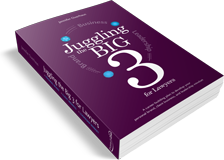Brand
Business
Leadership

“This book tells you all you need to know about how to get on.” The Times
“Relatively few books have been written with assistant solicitors in mind, about how to succeed at the business of being a lawyer… fewer still have devised a programme for so doing that runs alongside a book. This book does both.”Law Society (The Law Management Section)
5 star rating HR Magazine
In my last blog I talked about the importance of listening. To follow on from there...
When really interested and engaged, you should follow up on the speaker’s statements. This shows that you are listening with intent. Note that such comments are not interruptions! If well chosen, they should have a number of beneficial effects:
They encourage the speaker to continue: “I can’t believe that you coped when [insert unbelievable situation] happened. Tell me more!”
They subtly flatter: “That’s so impressive. Personally, I could never jump out of an airplane at 12,000 feet. Sometimes I need a glassful of wine just to get into one!”
They suggest that you empathize: “Gosh, that’s awful—the first and only time I was rushed to the hospital with an injury, I fainted before I got there.”
They provide openings for questions: “How on earth did you manage that without any support?”
And if none of these are appropriate, you can at least acknowledge that you’re taking it all in with the occasional comment, “Gosh . . . amazing . . . Tell me more!”
Posted on 27/03/2011
The most basic rule of business development is something lawyers often forget. It’s this: tragic as it may seem, clients don’t care about what you do. Instead, they stubbornly persist in caring about their own problems and needs. (Very strange (not!), but true . . . )
Posted on 21/07/2010